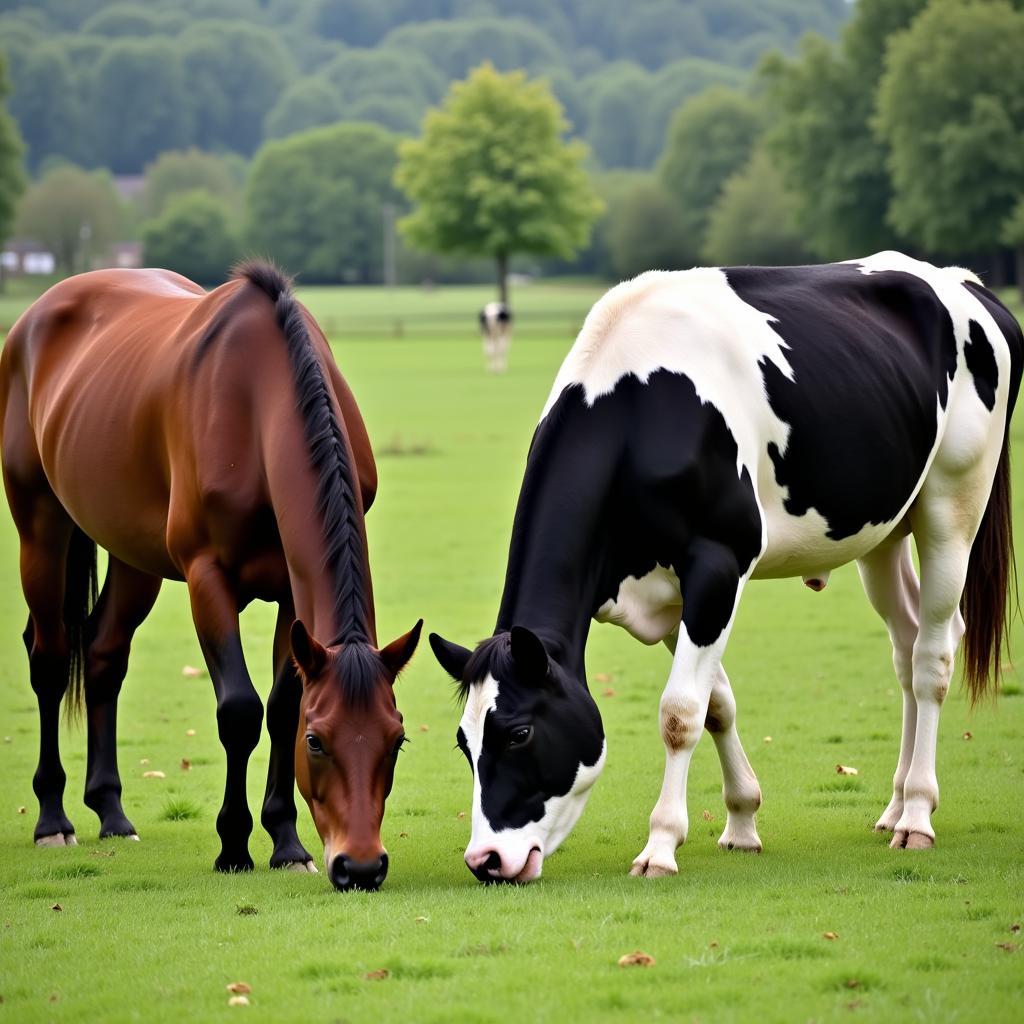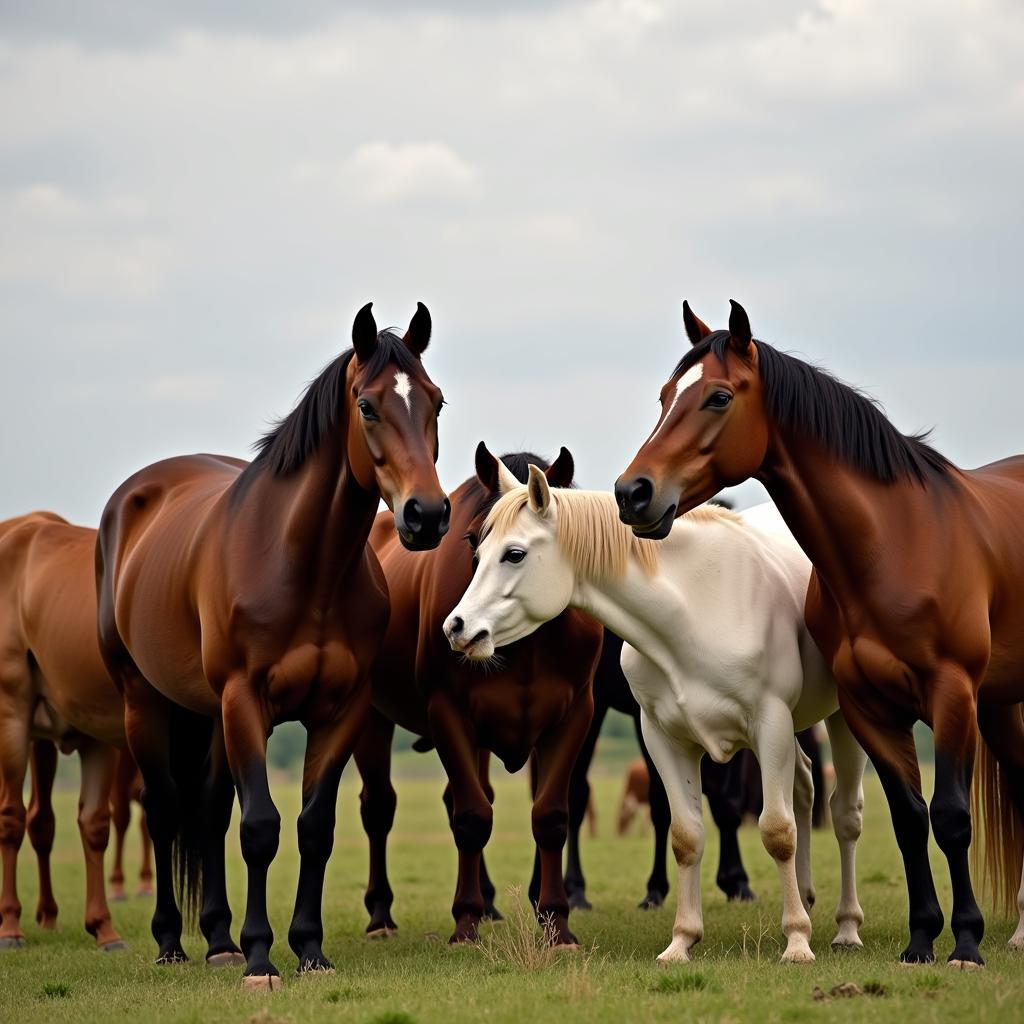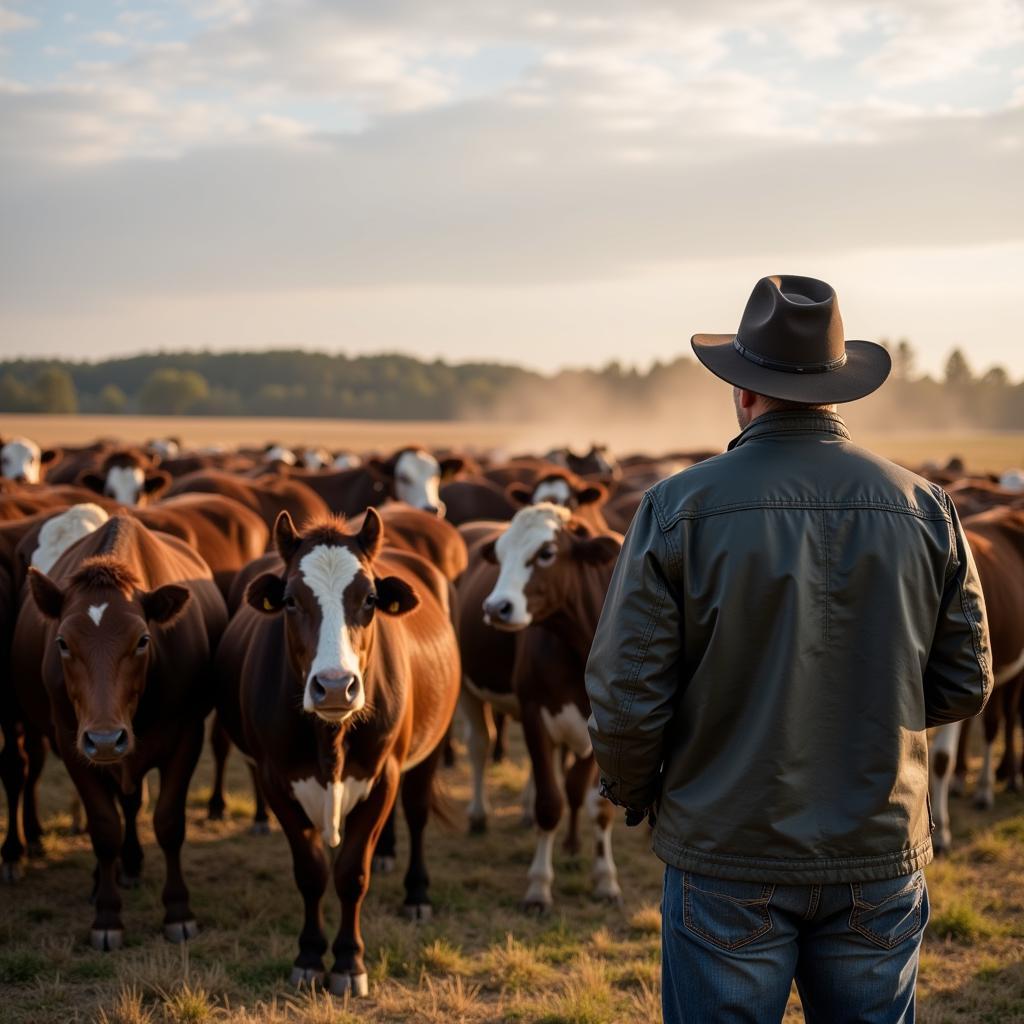The term “Horse Cow” might seem unusual at first, as it doesn’t refer to a single species. Instead, it speaks to the intriguing dynamic between horses and cows, two animals often sharing pastures and impacting each other’s lives. This article delves into the various facets of this relationship, exploring both the benefits and challenges of keeping horses and cows together.
 Horse and Cow Grazing Peacefully in a Shared Pasture
Horse and Cow Grazing Peacefully in a Shared Pasture
Can Horses and Cows Live Together Peacefully?
The age-old question of whether horses and cows can coexist peacefully is a multifaceted one. While they are different species with distinct behaviors, their cohabitation can be surprisingly successful under the right conditions.
Horses and cows are both herd animals, instinctively seeking the company of their kind. However, they can learn to tolerate and even benefit from each other’s presence.
 Horses and Cows Displaying Non-Aggressive Behaviors
Horses and Cows Displaying Non-Aggressive Behaviors
Benefits of Keeping Horses and Cows Together
Integrating horses and cows can offer some noteworthy advantages for both the animals and the landowner.
Improved Pasture Management
One significant benefit lies in improved pasture management. Horses and cows have different grazing habits. Cows, being ruminants, graze closer to the ground and consume a wider variety of plants. Horses, on the other hand, are more selective grazers, often leaving taller, coarser grasses untouched. This difference in grazing patterns can lead to a more balanced utilization of the pasture, reducing the risk of overgrazing and promoting healthier plant diversity.
Natural Deworming
Another advantage is the potential for natural deworming. Horses and cows are susceptible to different internal parasites. Sharing a pasture can disrupt the lifecycle of these parasites, as they are less likely to thrive in a host species they are not adapted to. This can contribute to reduced reliance on chemical dewormers, promoting the well-being of both animal groups.
Socialization and Companionship
While not always the primary consideration, the social aspect can also be a factor. Some horses, especially those kept in small groups, might benefit from the presence of cows as companions. The larger, mixed herd environment can offer stimulation and reduce boredom.
save a horse ride a cowboy shirt
Potential Challenges and Considerations
While co-grazing horses and cows can be beneficial, it’s essential to acknowledge potential challenges and implement careful management practices.
Fencing and Space Requirements
Adequate fencing is crucial. Horses, known for their agility, require secure fencing to prevent escapes. Additionally, providing sufficient space is vital to avoid competition for resources and minimize the risk of injuries, especially if a horse feels threatened.
Dietary Needs and Potential Toxicity
Horses and cows have different nutritional requirements. While sharing pasture might offer some dietary variety, it’s crucial to monitor their intake and provide appropriate supplements if necessary. Certain plants that are safe for cows can be toxic to horses, so careful pasture management is essential.
Herd Dynamics and Potential Conflicts
Introducing horses and cows should be done gradually, allowing them to acclimate to each other’s presence. While generally peaceful, conflicts can arise, particularly during feeding times or when establishing herd hierarchy. Close observation, particularly during the initial stages of integration, is crucial to ensure the safety and well-being of all animals.
 Farmer Monitoring Mixed Herd of Horses and Cows
Farmer Monitoring Mixed Herd of Horses and Cows
Expert Insights
“While every situation is unique,” shares Dr. Emily Carter, a veterinarian specializing in equine and bovine care, “successful integration of horses and cows often depends on careful planning and observation. Understanding the specific needs of each species, providing ample space, and monitoring their interactions are key to fostering a harmonious environment.”
Conclusion
The relationship between horses and cows is a complex one, offering both potential benefits and challenges. By understanding their distinct behaviors, implementing appropriate management strategies, and prioritizing the well-being of both species, co-grazing can be a viable and even advantageous practice.
FAQ
Can horses and cows eat the same hay?
While they can share some types of hay, it’s crucial to ensure the hay is free from potential toxins for horses and meets the nutritional requirements of both species.
Do horses bully cows?
While generally peaceful, individual personalities and herd dynamics play a role. Horses might display dominant behaviors, so close monitoring is essential.
What is the ideal ratio of horses to cows in a shared pasture?
There’s no one-size-fits-all ratio. Factors like pasture size, forage availability, and the individual animals’ temperaments should be considered.
Can horses and cows share a water source?
Yes, they can share a water source, but providing ample space and multiple watering locations can prevent competition and potential conflicts.
cowboy rv park and horse hotel
Are there any specific breeds of horses or cows that coexist better?
While breed can play a minor role, individual temperament and early socialization experiences often have a more significant impact on their compatibility.
Need assistance with your horses or considering integrating cows into your pasture management plan? Contact Justus Horses USA at 0772127271, email us at [email protected], or visit us at QGM2+WX2, Vị Trung, Vị Thuỷ, Hậu Giang, Việt Nam. Our team of experts is available 24/7 to offer guidance and support.